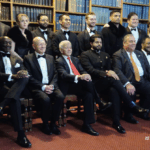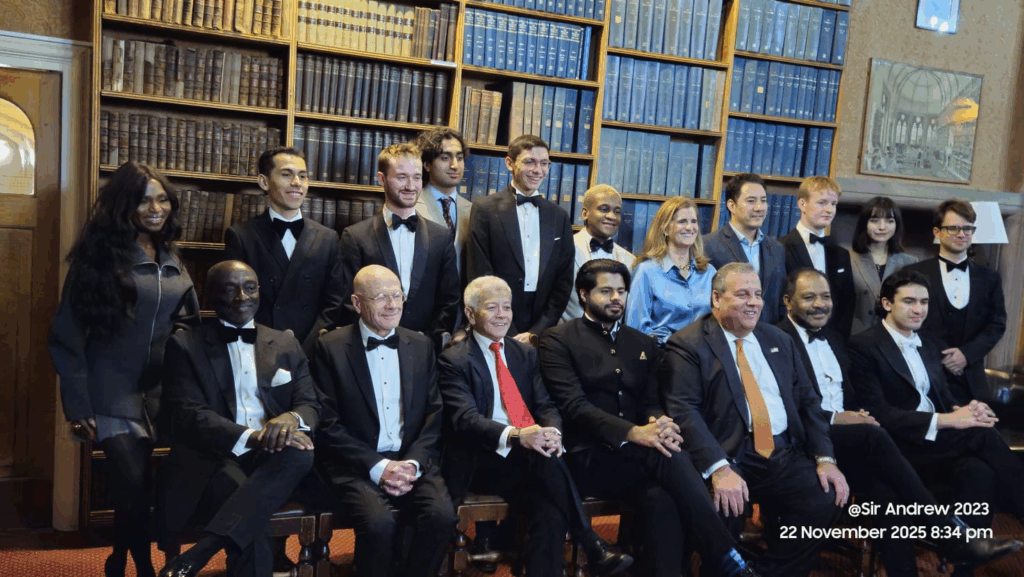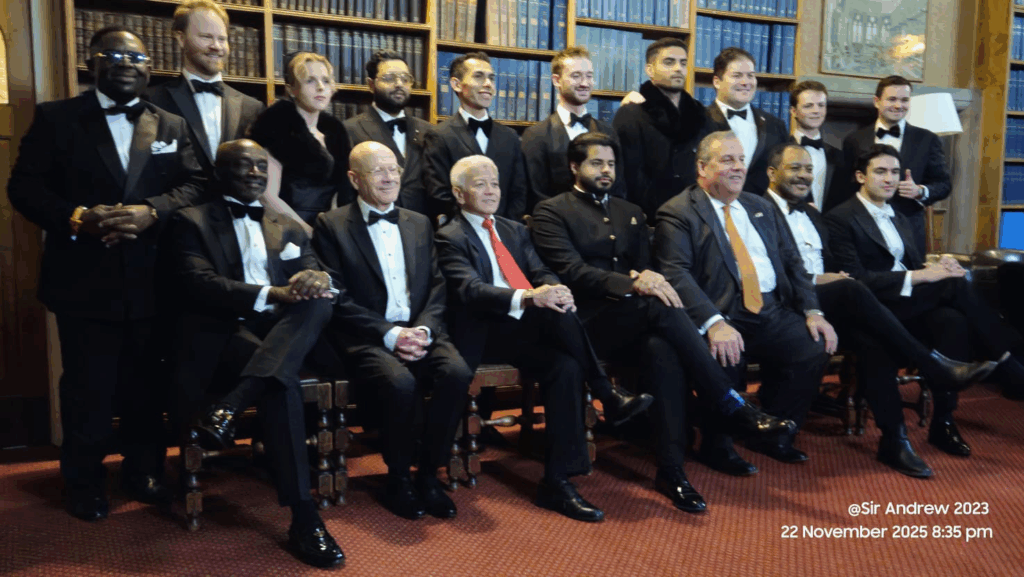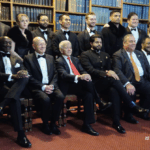
The Oxford Union chamber was filled with more than 200 members and guests last Saturday, 22 November 2025.
Ambassador Edward Akwasi Boateng, former Ghana Ambassador to China, Mongolia and North Korea, former Director-General of the State Interests and Governance Authority (SIGA), founder of Global Media Alliance, and former Senior Executive at Turner Broadcasting/CNN, delivered a compelling, people-centred argument in support of the motion, “This House Would Rather Be ‘Built’ by China Than ‘Blessed’ by America.”
He spoke after the former Governor of New Jersey and U.S. Republican Presidential Candidate Chris Christie, opening his remarks by addressing him directly. It felt, to many of us in the chamber, as though he was cutting through the thick haze left by the opposition, reminding the House that “America was not at the G20 Summit hosted in South Africa” and asking, pointedly, “how are we to seek America’s blessing when they were absent from the table”. He returned to this line in his closing remarks as he brought the proposition to a strong finish.

A Debate About the Future
From the outset, Ambassador Boateng grounded the discussion in lived realities: functioning clinics, reliable power, decent roads, access to markets, and opportunities that lift families out of poverty. He reminded the chamber that millions across Africa still live on less than one dollar a day, while China has lifted nearly 800 million people from poverty in the last fifty years.
“My vision is that we can also lift 800 million of our people out of poverty. You do that by building the right infrastructure and the right frame of mind. The question before us is not about East or West; it is about the mothers who want clinics that work, young people who need jobs, farmers who need access to markets and communities who deserve dignity through development.”
Drawing from decades of diplomatic and private-sector experience, he contrasted ideological debates with China’s visible, practical contributions. “When China builds, people feel the impact immediately. Roads appear, bridges open, factories rise, and young people find work. These are not abstract policy conversations; these are real improvements in people’s lives.”
Reflecting on his years in Beijing, he shared:
“When I arrived in Beijing, the people surprised me. They did not present themselves as ‘the great people of China.’ They were modest, self-critical and determined. They taught themselves how to work, to filter, to build. Watching them, I asked myself: how did they lift 800 million people from poverty? The answer lay in discipline, planning and relentless execution.”
He emphasised that Africa does not seek new masters, but new models of partnership that respect sovereignty, prioritise development, and align with national aspirations. “A country cannot lecture its way out of poverty; it must build its way out of poverty. Our people need roads, power, hospitals, rail lines and industries.”
He concluded with a passionate reminder that development must always place people at the centre:
“Our children cannot wait. Our economies cannot wait. Our communities cannot wait. We must choose partnerships that help us build because only through building can we secure dignity, prosperity and hope for our people. If China wants to be understood, if it seeks trust and an influential role in shaping the next chapter of global leadership, then Chinese leaders must step forward, communicate openly, and articulate their vision, values and intentions with far greater clarity and consistency.”
Speakers
Both sides of the debate were opened by Oxford Union student speakers, who are also Union officers. The principal invited speakers then closed for each side.
For the proposition: Ambassador Edward Boateng; Professor Danny Quah, Li Ka Shing Professor in Economics at the Lee Kuan Yew School of Public Policy; and Martin Jacques, journalist and author of When China Rules the World.
For the opposition: Governor Chris Christie, followed by Fidelis Leite Magalhães, Senior Minister and Minister of Parliamentary Reform of Timor-Leste, who closed for the opposition.
Ambassador Boateng delivered the closing speech for the proposition.

Post-Debate Reflections: A Shift in the Room
After the debate, Ambassador Boateng reflected on the atmosphere in the chamber, noting that even among some of the world’s brightest students, understanding of China’s contemporary role remains limited.
“When I shared our direct work with China in Africa; real results, real communities transformed, and the potential of China’s zero-tariff policy to change the lives of African families, the mood in the room shifted. Many told me afterwards that they had never heard this side of China’s global engagement before.”
The final vote, 126–106, reflected this shift while showing that many remained genuinely uncertain.
“The world does not need a louder China; it needs a more communicative China. Only when China tells its story transparently and confidently can the world engage in an honest conversation about the future we all hope to build.”
Centring Diaspora Engagement
As part of his two-day visit, Ambassador Boateng hosted members of the Oxford Ghana Society (in formation), together with some African students, for a brunch and fireside conversation. The dialogue felt especially meaningful for many of us navigating our own futures in Africa’s development and public service. We will be sharing more highlights from this special conversation in a follow-up article.
- President Commissions 36.5 Million Dollars Hospital In The Tain District
- You Will Not Go Free For Killing An Hard Working MP – Akufo-Addo To MP’s Killer
- I Will Lead You To Victory – Ato Forson Assures NDC Supporters
Visit Our Social Media for More




